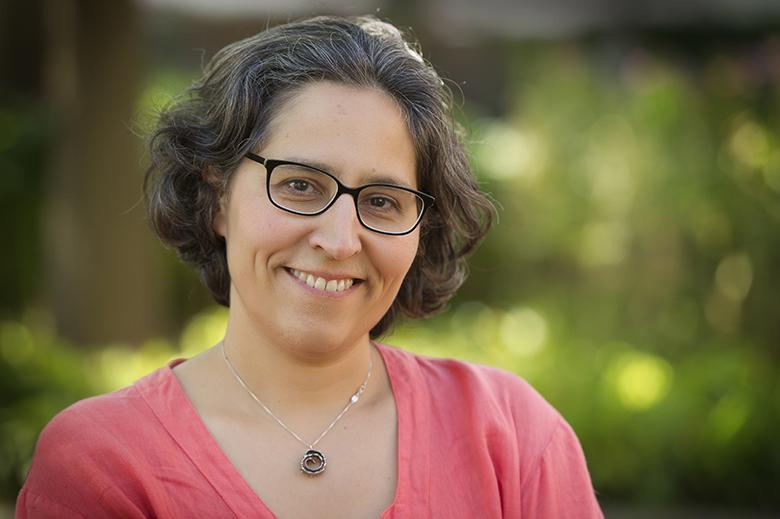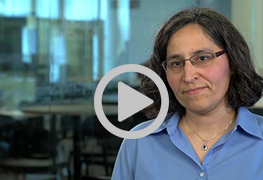Emmanuelle Arnaud

Find Related People by Keyword
Emmanuelle grew up in France and came to Canada when she was 10. In university, she was passionate about geography and history. In the end, she decided to pursue graduate studies in geography following a USRA summer position where she did field work throughout southern Ontario. She completed her MSc degree with field work on Vancouver Island looking at the impact of forestry as recorded in lake sediments. After completing her Master’s degree, she returned to Hamilton for her PhD, where she continued to focus on the sedimentary record of environmental change but this time focused on some very old rocks and a record of an ancient glaciation. Her research eventually shifted to focus on applied aspects of glacial geology as it relates to groundwater resources.
Meet Prof. Emmanuelle Arnaud
Prof. Emmanuelle Arnaud is a researcher in the School of Environmental Sciences who studies recent and ancient glacial deposits.
Check out Emmanuelle's 60 second snapshot video here.
Academic History
- Combined Honours Degree, Physical Geography and History, McMaster University, 1991
- Master’s of Science, Geography, University of British Columbia, 1995
- Doctor of Philosophy, Geology, McMaster University, 2002
Affiliations and Partnerships
- Morwick G360 Groundwater Research Institute
- Natural Sciences and Engineering Research Council (NSERC)
Awards and Honours
- G. P. McRostie Faculty Award (2010)
Research Impact
Emmanuelle’s research program focuses on two aspects of glacial geology: reconstructing the nature of past glaciations; and using our knowledge of glacial settings to characterize the nature of subsurface glacial deposits in the context of groundwater resource management and source water protection. Reconstructions of past glacial conditions helps to better understand the nature of past climatically-driven environmental changes during different glacial periods in Earth history. Reconstructions of the nature and distribution of subsurface materials are also used by groundwater scientists to manage groundwater resources. Her geological conceptual models help groundwater modellers predict how groundwater quantity will change with climate change or where contaminants will end up as they migrate through the subsurface.
Current Research Projects
Impact of glaciation on groundwater vulnerability
The objective of my research program is to improve our ability to protect vulnerable groundwater resources in previously glaciated regions by examining and gaining new insights into how glaciation has impacted geological materials, their subsurface distribution and their hydrogeological properties at the well-field scale. My NSERC Discovery Grant funded research is currently focused on three different projects: to examine the association between subsurface stratigraphy, landform at surface and groundwater quality; to explore how buried bedrock valley influence the productivity of underlying bedrock aquifers; and to identify the relationship between contact aquifers, substrate hydrology and associated glacial processes.
Advancement of groundwater multi-level system technologies for improved management of source water in fractured sedimentary bedrock
This study is designed to assist municipalities and townships reliant on a Silurian dolostone bedrock aquifer (e.g. Guelph, Puslinch, Erin, Centre Wellington and Guelph-Eramosa) in the management and protection of their groundwater by developing high resolution characterization methods, monitoring infrastructure and protocols and addressing specific issues related to water quantity or quality within and across five neighbouring municipalities.
Land conversion impacts on soil and water dynamics in the Highway 11 corridor
This study assesses the impact of land conversion on soil and water dynamics using data from 2 farms in Northern Ontario’s clay belt. We are characterizing the variability in soils using short cores and geochemical and physical analyses of soil samples and monitoring groundwater hydrology and water quality using monitoring wells and water geochemistry analyses at both forested and cultivated sites. Impacts of past and future land use and management practices will be assessed using hydrological modelling.
Understanding groundwater, agronomy and drainage system design influences on tile water quantity and quality
This study is designed to examine how various types of tile drainage systems impact groundwater quantity and quality, and conversely how spatiotemporal variations in groundwater elevation, quality and geology influence tile drainage
Scholarship of Teaching and Learning-Graduate Student’s perception of the IDP
This study is designed to better understand graduate students’ perception of the effectiveness of the Individual Development Plan-an iterative tool designed to assist them with their academic, professional, and personal goals. This is a mixed method study using both surveys and focus groups to assess how useful the students felt that each component of the IDP was as well as what they gained from it in terms of professional development.
Graduate Student Information
Emmanuelle’s mentoring approach is to provide students with quality one-on-one skills and knowledge training, professional development opportunities through her connections in the academic, public and environmental sector, extensive feedback on thesis writing, andan inclusive and collegial research work environment where mutual respect, diversity and work-life balance is valued. Emmanuelle’s students also benefit from their membership in Morwick G360 Groundwater Research Institute- a group of scientists and engineers focused on various dimensions of groundwater research- by being exposed to other researchers and research projects as well as opportunities to learn from participating in various field campaigns. Emmanuelle also likes to help students find graduate programs or employment that best suits their skills and interest upon graduation. If you are interested in working with Emmanuelle, reach out to her via email.
Publications
- Meyer, J., Parker, B. L., Arnaud, E., Runkel, A.C., 2016. Combining High Resolution Vertical Gradients and Sequence Stratigraphy to Delineate Hydrogeologic Units for a Contaminated Sedimentary Rock Aquifer System. Journal of Hydrology, 534:505-523.
- Best, A., Arnaud, E., Parker, B. L., Aravena, R., Dunfield, K. 2015. Effects of glacial sediment type and land use on nitrate patterns in groundwater. Groundwater Monitoring and Remediation Special Focus Issue on Monitoring and remediation of agricultural non-point sources impacting groundwater quality, 35: 68-81.
- Arnaud, E. and Eyles, C. H. 2006. Neoproterozoic environmental change recorded in the Port Askaig Formation, Scotland: climatic and tectonic controls on sedimentation. Sedimentary Geology, 183:99-124.
- Arnaud, E., Halverson, G. P. and Shields-Zhou, G. (eds), 2011. The Geological Record of Neoproterozoic Glaciations. Geological Society of London, Memoirs 36. 735 pp.
- Eyles, N., Arnaud, E., Scheidegger, A. E. and Eyles, C. H. 1997. Bedrock jointing and geomorphology in Southwestern Ontario, Canada: an example of tectonic predesign. Geomorphology, 19: 17-34.
For a full list of publications, refer to the Google Scholar Profile.
